沈阳版牛津英语8B英语导学案20
- 格式:doc
- 大小:34.50 KB
- 文档页数:2
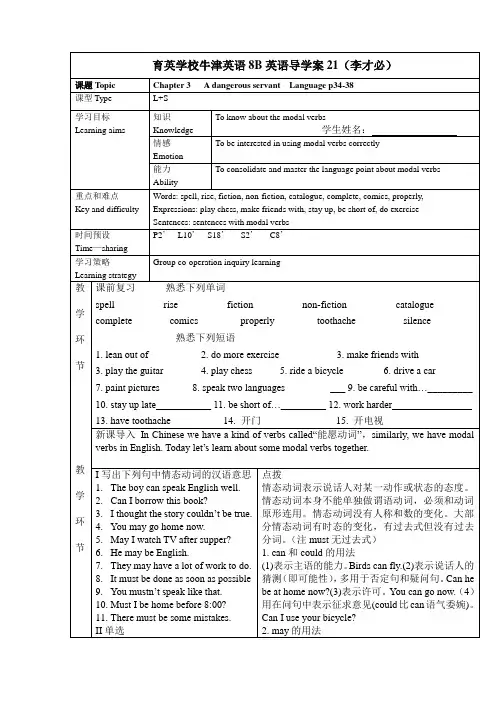
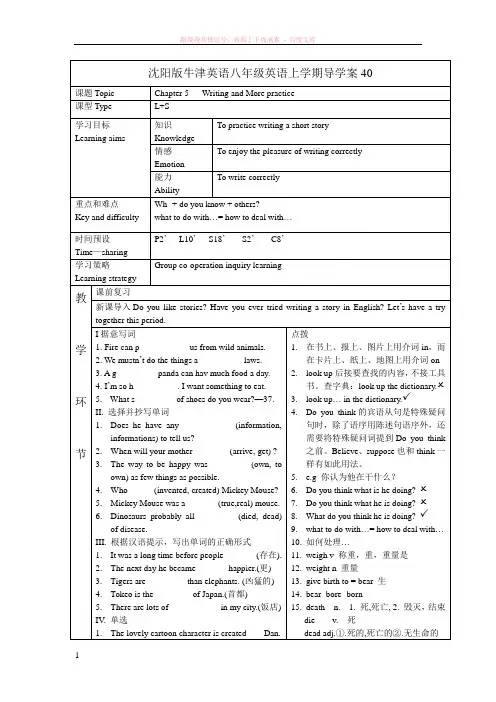
沈阳版牛津英语八年级英语上学期导学案40课题Topic Chapter 5 Writing and More practice课型Type L+S学习目标Learning aims 知识KnowledgeTo practice writing a short story情感EmotionTo enjoy the pleasure of writing correctly能力AbilityTo write correctly重点和难点Key and difficulty Wh- + do you know + others?what to do with…= how to deal with…时间预设Time—sharingP2’L10’S18’S2’C8’学习策略Learning strategyGroup co-operation inquiry learning教学环节课前复习新课导入Do you like stories? Have you ever tried writing a story in English? Let’s have a try together this period.I据意写词1. Fire can p___________ us from wild animals.2. We mustn’t do the things a__________ laws.3. A g_________ panda can hav much food a day.4. I’m so h__________. I want something to eat.5. --What s_________ of shoes do you wear?—37.II. 选择并抄写单词1.Does he have any ___________ (information,informations) to tell us?2.When will your mother ________(arrive, get) ?3.The way to be happy was _________(own, toown) as few things as possible.4.Who______(invented, created) Mickey Mouse?5.Mickey Mouse was a _______(true,real) mouse.6.Dinosaurs probably all _________(died, dead)of disease.III. 根据汉语提示,写出单词的正确形式1.It was a long time before people _______(存在).2.The next day he became _______happier.(更)3.Tigers are _________than elephants. (凶猛的)4.Tokeo is the ________ of Japan.(首都)5.There are lots of ___________ in my city.(饭店)IV. 单选1.The lovely cartoon character is created ___ Dan.点拨1.在书上、报上、图片上用介词in,而在卡片上、纸上、地图上用介词on2.look up后接要查找的内容,不接工具书。
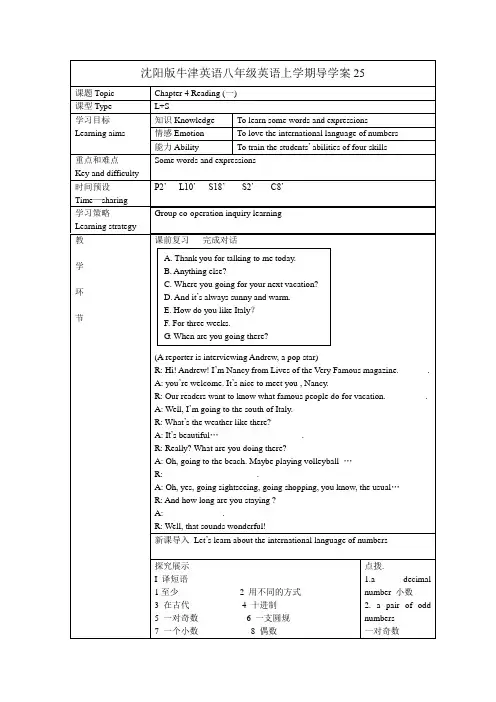
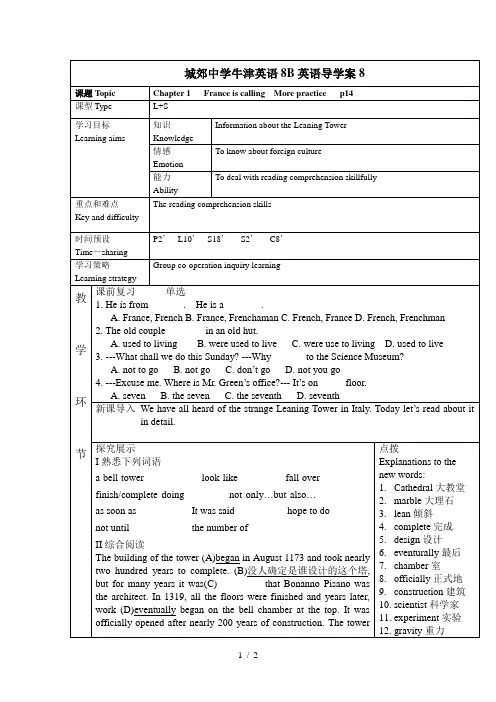
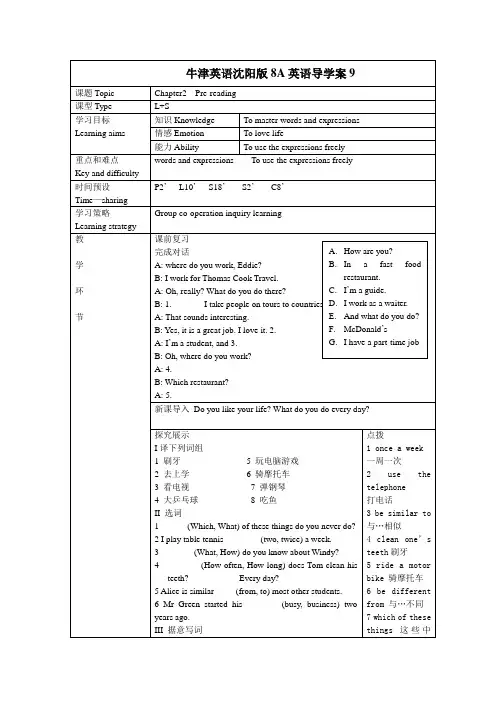
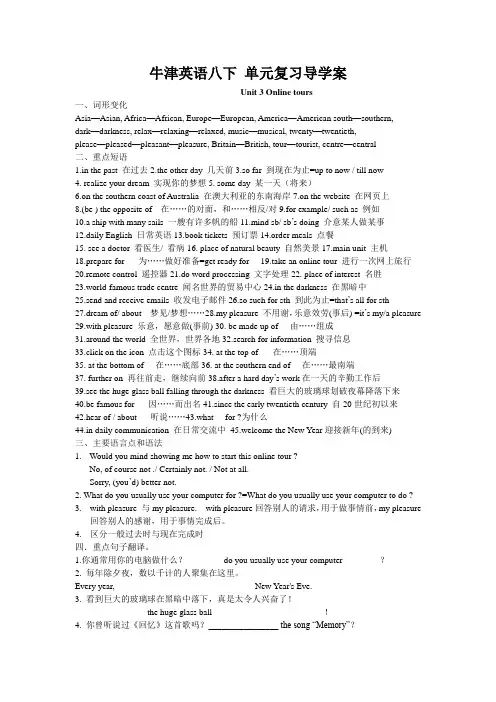
牛津英语八下单元复习导学案Unit 3 Online tours一、词形变化Asia—Asian, Africa—African, Europe—European, America—American south—southern, dark—darkness, relax—relaxing—relaxed, music—musical, twenty—twentieth, please—pleased—pleasant—pleasure, Britain—British, tour—tourist, centre—central二、重点短语1.in the past 在过去2.the other day 几天前3.so far 到现在为止=up to now / till now4. realize your dream 实现你的梦想5. some day 某一天(将来)6.on the southern coast of Australia 在澳大利亚的东南海岸7.on the website 在网页上8.(be ) the opposite of---在……的对面,和……相反/对9.for example/ such as 例如10.a ship with many sails 一艘有许多帆的船11.mind sb/ sb’s doing 介意某人做某事12.daily English 日常英语13.book tickets 预订票14.order meals 点餐15. see a doctor 看医生/ 看病16. place of natural beauty 自然美景17.main unit 主机18.prepare for ----为……做好准备=get ready for----19.take an online tour 进行一次网上旅行20.remote control 遥控器21.do word processing 文字处理22. place of interest 名胜23.world-famous trade centre 闻名世界的贸易中心24.in the darkness 在黑暗中25.send and receive emails 收发电子邮件26.so such for sth 到此为止=that’s all for sth27.dream of/ about---梦见/梦想……28.my pleasure 不用谢,乐意效劳(事后) =it’s my/a pleasure 29.with pleasure 乐意,愿意做(事前) 30. be made up of----由……组成31.around the world 全世界,世界各地32.search for information 搜寻信息33.click on the icon 点击这个图标34. at the top of-----在……顶端35. at the bottom of----在……底部36. at the southern end of----在……最南端37. further on 再往前走,继续向前38.after a hard day’s work在一天的辛勤工作后39.see the huge glass ball falling through the darkness 看巨大的玻璃球划破夜幕降落下来40.be famous for ----因……而出名41.since the early twentieth century 自20世纪初以来42.hear of / about ----听说……43.what----for ?为什么44.in daily communication 在日常交流中45.welcome the New Year迎接新年(的到来)三、主要语言点和语法1. --Would you mind showing me how to start this online tour ?--No, of course not ./ Certainly not. / Not at all.--Sorry, (you’d) better not.2. What do you usually use your computer for ?=What do you usually use your computer to do ?3.with pleasure 与my pleasure. with pleasure回答别人的请求,用于做事情前,my pleasure回答别人的感谢,用于事情完成后。
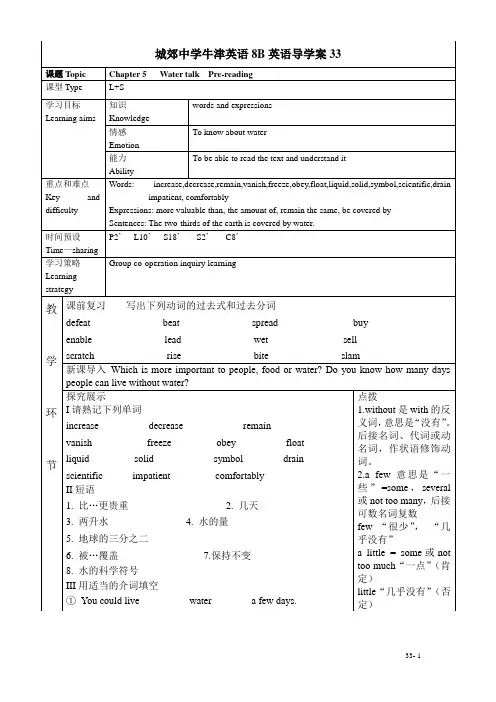
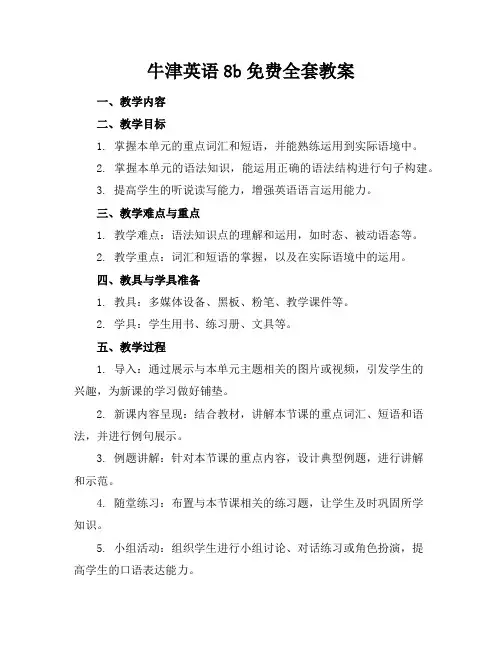
牛津英语8b免费全套教案一、教学内容二、教学目标1. 掌握本单元的重点词汇和短语,并能熟练运用到实际语境中。
2. 掌握本单元的语法知识,能运用正确的语法结构进行句子构建。
3. 提高学生的听说读写能力,增强英语语言运用能力。
三、教学难点与重点1. 教学难点:语法知识点的理解和运用,如时态、被动语态等。
2. 教学重点:词汇和短语的掌握,以及在实际语境中的运用。
四、教具与学具准备1. 教具:多媒体设备、黑板、粉笔、教学课件等。
2. 学具:学生用书、练习册、文具等。
五、教学过程1. 导入:通过展示与本单元主题相关的图片或视频,引发学生的兴趣,为新课的学习做好铺垫。
2. 新课内容呈现:结合教材,讲解本节课的重点词汇、短语和语法,并进行例句展示。
3. 例题讲解:针对本节课的重点内容,设计典型例题,进行讲解和示范。
4. 随堂练习:布置与本节课相关的练习题,让学生及时巩固所学知识。
5. 小组活动:组织学生进行小组讨论、对话练习或角色扮演,提高学生的口语表达能力。
六、板书设计1. Unit 1 Past and Present2. 重点词汇和短语:ancient, tradition, modern, technology, sport, cartoon等。
3. 语法结构:一般过去时、一般现在时、被动语态等。
七、作业设计1. 作业题目:(1)抄写本节课所学重点词汇和短语,每个单词写5遍。
① I ______ (use) the internet every day.② The Great Wall ______ (build) in ancient times.What's the main idea of Unit 1 Past and Present?2. 答案:(1)见板书。
(2)① use ② was built八、课后反思及拓展延伸1. 反思:本节课的教学效果如何?哪些环节需要改进?2. 拓展延伸:鼓励学生课后收集与新课相关的资料,如历史、文化、科技等方面的内容,以便在下一节课进行分享和讨论。
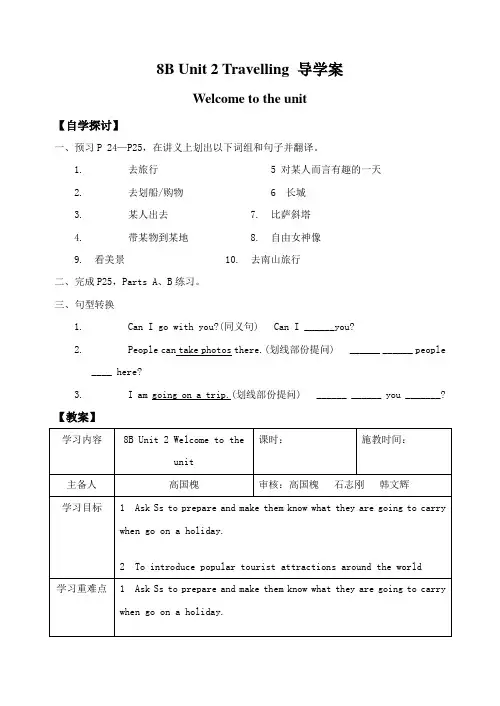
8B Unit 2 Travelling 导学案Welcome to the unit【自学探讨】一、预习P 24—P25,在讲义上划出以下词组和句子并翻译。
1.去旅行 5 对某人而言有趣的一天2.去划船/购物 6 长城3.某人出去 7. 比萨斜塔4.带某物到某地 8. 自由女神像9. 看美景 10. 去南山旅行二、完成P25,Parts A、B练习。
三、句型转换1.Can I go with you?(同义句) Can I ______you?2.People can take photos there.(划线部份提问) ______ ______ people____ here?3.I am going on a trip.(划线部份提问) ______ ______ you _______?【教案】【当堂巩固】一、单项选择题()1. Don’t look out ____ the window. You can’t see anything ______ it.A. from; fromB. of ; fromC. from ; ofD. of ; of()2. When you come next time, please______ your book here.A. bringB. takeC. fetchD. carry()3. I don’t think he is going with me, _______.A. do IB. don’t IC. is heD. is n’t he()4. He______be at home, because there is light in his room.B. can’tC. canD. might()5. I want you _______ so much noise.A. don’t makeB. not to makeC. to not makeD. not make()6. --- _____ are you going there?--- On foot.A. WhereB. WhyC. HowD. What() Do you like______ ?--- Yes, very much.A. go fishingB. going fishingC. going fishD. going to fish()8. He was_____ excited _____ he forgot to take the bag.A. too, toB. such, thatC. so, thatD. too,that() I don’t know what to do?--- Why not _______ ?A. To join usB. to join in usC. join usD.join with us() new book_______ very interesting.A. beB. maybeC. can’tD. must beReading【自学探讨】1.跟磁带朗诵第课文,可要注意语音语调。
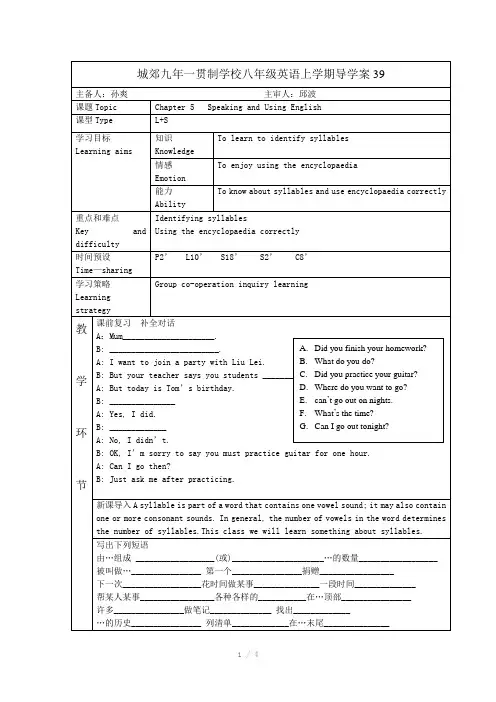
点拨英语单词在发音的时候,不是一个字母一个字母地来发音的,而是几个字母几个字母地拼起来发音的,几个拼起来发音的字母叫一个“音节”。
比如单词China划分成chi-na两个音节, internationa划分成in-ter-na-tio-nal五个音节English划分成Eng-lish两个音节。
常见的划分音节的方法简介如下:1一个音节至少有一个元音字母。
即a e i o或u, 有时也可以是y。
如 re/fuse un/com/for/ta/ble jum/ping a/void for/ty2当两个元音字母中间只有一个辅音字母 (r除外),而且左边的元音又是按重读开音节规则发音时,这个辅音字母通常划入右边的音节。
如stu/dent o/pen pa/per pi/lot 3两个元音之间只有一个辅音字母或辅音字母组合,左边的元音按重读闭音节规则发音,那么这个辅音字母或辅音字母组合通常划入左边的音节。
如 moth/er broth/er4如果两个元音字母中间有两个辅音字母,通常这两个辅音字母分别划入左右两个音节。
如 mem/ber les/son col/lect shal/low hap/pen dis/tant5如果两个元音字母中间有两个辅音字母,第一个是r,这两个辅音字母也分别划入左右两个音节。
第一个音节左边那个音节称为r音节按重读r音节读音规则发音。
如 cor/ner por/trait har/bor bar/ber6如果两个元音或元音和半元音字母组合发的是一个元音或双元音划分音节时,不能将其从中分开,要划在一起。
如oi: boil ou: through/out ow: tow/er7有些辅音字母经常在一起,只发一个辅音或者联系很紧密。
划分音节时也不能将其分开。
如ph: tele/phone sh: wash/esr th: pa/thetic wh: a/while8辅音字母组合构成发音的辅音连缀划分音节时也不能将其分开。
![沈阳版牛津英语八年级英语上学期导学案24[1]](https://uimg.taocdn.com/c35a49cb8bd63186bcebbcab.webp)
育英学校牛津英语8B英语导学案20(李才必)课题T opic Chapter 3 A dangerous servant Listening课型Type L+S学习目标Learning aims 知识KnowledgeListening comprehension; pronunciation and intonation情感EmotionTo learn about electricity学生姓名:能力AbilityTo improve listening skills重点和难点Key and difficulty Words: flat,machine, usual, fridge, vacuum, iron, kettle, cause, properly, check Expressions: go off, deal with, find out, a rice cooker, a vacuum cleaner….时间预设Time—sharingP2’L10’S18’S2’C8’学习策略Learning strategyGroup co-operation inquiry learning教学环节课前复习写出下列内容的同义词或短语1.after a long time_________ _________2.words that make something clear _________ _________3.that cannpt be seen_________4.kinds_________5.joined_________6.every month_________7.put under the ground_________8.partly_________ _________ _________9.the power to do things_________新课导入We have known something about France. Let’s know about it in detail now.探究展示I. 熟悉下列单词flat______ machine_________ usual__________ fridge_______vacuum________ iron________ kettle________ cause________properly__________ check_________ electrician___________II熟悉下列短语1. go off________2. deal with_________3. find out________4. an air conditioner________5. a washing machine_________6. a rice cooker__________7. a kettle_____________8. a vacuum cleaner____________ 9. an iron____________III.完成书上第34页的听力题。
初中牛津英语8b全部教案初中牛津英语8b全部教案1一、语言知识与技能1.根据读音规则和音标拼读单词。
2.理解和领悟词语的基本含义、语法项目以及语言形式的基本结构和常用表意功能;3.能在日常交际情景中听懂对话,例如,能听懂连续的指令并据此完成任务;能引出话题并进行几个回合的交谈;4.能听懂接近正常语速、熟悉话题的语段和简单故事,获取相关信息;5.能运用…..词汇和…..语言形式就熟悉的话题进行交谈;能运用…..词汇和…..语言形式及(或)所给提示描述人、物、事件、行为、特征等,表达简单的观点;6.能在教师的指导下进行简单的角色表演;7.能连贯、流畅地朗读课文;能从简单的*中找出有关信息,理解大意;根据上下文猜测生词的意思;8.每天课外阅读量最少达到100词。
9.能运用…..词汇和…..语言形式以及参照范例(*结构)写出简单的文段等,包括起草和修改。
二、文化意识10.了解语言和语用的文化因素,体验跨文化交际。
三、学习策略11-(1)利用读音规则和音标拼读词汇,利用上下文、非语言信息等理解词义,联想学习和记忆词汇,构词法等。
11-(2)利用情境等理解语法结构和表意功能,发现语言规律并举一反三。
11-(3)复习、整理归纳所学内容。
11-(4)利用预测、语调、重音、问题等来获取听力信息。
11-(5)在课内外活动中借助体态语用英语交流。
11-(6)利用预测、跳读、寻读、细节读等来获取*信息。
11-(7)仿写短文,准备素材、起草短文并修改。
11-(8)明确目标,制定计划,11-(9)了解并跨文化交际(恰当使用)。
四、情感态度12.乐于参与英语活动,敢于用英语表达,积极与他人合作,体验自己的学习效果。
备教学重、难点内容课标具体知识、技能、文化目标知识与技能、文化意识的重、难点内容课标具体策略目标选择sectionAsectionB目标1在读写过程中,能够根据读音规则和音标拼读单词。
11-(1)11-(2)11-(3)目标2词汇:name,nice,to,meet,too,your,Ms.,his,and,her,yes,she,he,no,not.语言形式:1)what’syourname?---Alan./I’mAlan./Myname’sAlan.2)Nicetomeetyou.3)What’shisname?---He’sEric./Hisname’sEric.4)What’shername?---She’sMary./Hername’sMary.5)IsheJack?---Yes,h eis./No,heisn’t.Hisname’sMike.6)AreyouHelen?---Yes,Iam./No,I’mnot.I’mGina.词汇:zero,one,two,three,four,five,six,seven,eight,nine,telephone,number ,phone,telephone/phonenumber,first,firstname,last,lastname,frien d,China,middle,school,middleschool.语言形式:1)What’syourphonenumber?---It’s…/Myphonenumberis…2)Isthisyourphonenumber?---Yes,itis./No,itisn’t.3)What’syourfirst/given/last/familyname?---Myfirst/given/last/fami lyname’s…初中牛津英语8b全部教案2一、总体目标1、加强课堂教学改革,真正转变课堂教学方式,提高学生的学习能力,争取把课堂变成学生学习的乐园。
牛津英语8B Unit3导学案一、教材分析:本单元的主题为“电脑”,Comic Strip部分通过Hobo与Eddie之间的对话,激发了学生对本单元的兴趣,唤起他们网上旅游学习文化知识的欲望,也引出了本单元的语法重点---被动语态;Welcome to the unit 中让学生根据图片选填正确的电脑用途,旨在帮助学生了解英语掌握电脑的基本用途即基本功能;Reading介绍了一种虚构的、有趣的教育类游戏光盘。
游戏玩家扮演主人公“痒痒脚”。
它在梦里旅游,行程中他必须回答各种问题,测试自己的英语语法和词汇能力以及地理知识。
V ocabulary通过图片向学生介绍电脑部件名称,旨在帮助学生用恰当的词汇来谈论计算机的功能和用途。
Grammar分A、B两部分介绍了“被动语态”的基本用法、结构以及用介词by来引出“动作执行者”在A部分通过Millie到商店购买电脑谈论电脑的相关情况及用本单元已经学过的词汇来谈论电脑部件及其功能,在B部分以一种虚构的教育类光盘“Saving Princess Laura”话题,帮助学生掌握“被动语态”的结构。
Integrated Skills以一种计算机教育软件的内容为主线,通过听力材料用相关的词汇来向他人介绍其它计算机教育软件,并向他人请求帮忙解决如何在电脑上使用教育类软件划。
Study skills教会学生根据不同类型的信息将词汇和观点进行分类。
Main task一块描述自己最喜欢的教育类游戏光盘为例,鼓励学生写出他们自己最喜欢的教育类光盘,以此训练学生的听、说、读、写一系列技能。
Checkout 一块继续以介绍电脑部件、用途及其功能为例,进一步复习并巩固“被动语态”与计算机相关词汇的正确使用。
二、教学三维目标:知识目标:1. 学习电脑部件名称、用途及其相关的词汇;2. 了解相关的有趣的教育类游戏光盘;3. 学习并使用一般现在时、一般过去时的被动语态,包括由by引出动作的执行者能力目标:1. 能根据关键词、图片、上下文和已有知识猜测文章大意和掌握具体细节,并能运用自己已经掌握的描写自己感兴趣的教育类关盘;2. 能用被动语态的一般现在时和一般过去时来谈论感兴趣的相关话题;3. 能询问和回答有关使用计算机教育然间的细节信息,并能根据不同类型的信息将词汇和观点进行分类情感目标:1. 通过了解有关教育类游戏关盘的信息,激发学生对使用教育类光盘或软件的兴趣;2. 唤起学生网上旅游学习的欲望,感受网上学习的乐趣。
育英学校牛津英语8B英语导学案19(李才必)课题Topic Chapter 3 A dangerous servant Reading(III) 课型Type L+S学习目标Learning aims 知识Knowledgewords and expressions学生姓名:情感EmotionTo know about electricity能力AbilityTo improve reading skills重点和难点Key and difficulty Words and expressions: Sentences: May I …?时间预设Time—sharingP2’L10’S18’S2’C8’学习策略Learning strategyGroup co-operation inquiry learning教学环节课前复习用所给动词的适当形式填空1. They _________ (be) friends since they were boys.2. Tom often _________ (go) to the school library to borrow books.3. By the end of last term, we _______ (learn) more than one thousand English words.4. Please _________ (not make) any noise. We are having a meeting.5. I am very sorry. I really _________ (not know) you were having a talk here.6. The boy is used to _________ (get) up early now.新课导入We have known something about France. Let’s know about it in detail now.探究展示翻译下列句子1.电是我们看不见的一种能量。
___________________________________________________2.你可以挑选你喜欢的任何东西。
___________________________________________________3.电在电线中流动。
___________________________________________________4.仪表可以测量出你所使用的电量。
___________________________________________________5.我们可以把它变成看得见,听得见或者摸得着的能量。
___________________________________________________6.他根本就不知道电是什么。
___________________________________________________7.电通过导线传输。
___________________________________________________8.电比水要危险得多。
___________________________________________________点拨although conj. =though 虽然;尽管much more dangerousthan...much用来修饰比较级可以修饰比较级的:much, a lot, far, ……得多 a little, a bit, 一点儿even 甚至,still仍然connect v. (使)连接;联结connect A to/ with Bconnect A and Bpower n. 1电力供应a power station 发电厂/站教学环节9.它们是里面有电的包装。
___________________________________________________10. 他以为可以论包买到它。
___________________________________________________改写句子1. My father bought me a new bicycle. (改为被动语态)A new bicycle _________ _________ for me by my father.2. Everything goes well.(改为反意疑问句)Everything goes well, ________ ________?3. They are running fast. (改为感叹句)_________ _________ they are running!4. She became ill because it was too cold. (改为简单句)She became ill _________ _________ the cold weather.5. He asked the girl:‘Why do you live in the country?’(间接引语)He asked the girl _________ she _________ in the country.6. The thick wires are buried under the street. (改为被动语态)We ________ the ________ ________ under the street.7. What does it look like? Tell me please.(改为宾语从句)Can you tell me _______ ________ _________ ________?2能力powerless adj. 无能为力的be powerlessto do sth.powerful adj.强有力的powerful weapons 强大的武器contain v. 包含;含有;容纳container n. 容器chemical1n. 化学物质2adj. 化学的chemistry n. 化学chemist n. 化学家;药剂师produce v. 生产product n. 产品production n. 生产;产量反馈检测根据题意写单词1.Don’t you think that we can buy electricity in______________ like sweets?2. I cannot turn on the light, so I think I have to buy another light __________3. There is a large ______________of work for us to do every day.4. A metre ___________ the amount of electricity you use.5. You can go to your teacher for further ___________ if you don’t understand it well.6. A ___________ station is where we make electricity.7. ______________ contain chemicals that can produce electricity.8. Thin wires are connected to thick ones that are _________ under the street.课后作业选词填空1.Does _________(anyone, someone) want ___________(something, anything)?2.Ha! Ha! I’ve tricked Daisy at__________(last, least)!3.Do you know___________________(what’s electricity, what electricity is)?4.Electricity comes into our flat _________(through, across) thin wires.5.We can change it ________(in, into) forms of energy we can see, hear or feel.6.Can we buy electricity ________(with, in) packets, like sweets?7.We get a bill for the amount of the electricity we used _________(month, monthly).8.Electricity is just like air. It’s ___________(invisible, visible).9.I can’t believe ________(what, that) he said at the meeting.10.Can’t you see the grin _____(on, in) his face? Don’t believe him!反思。